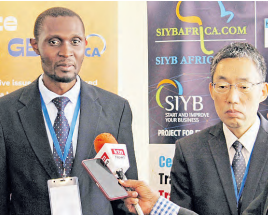

The high-risk nature of lending to Kenya’s Micro, Small, and Medium Enterprises (MSMEs) sector has seen financing deficit grow to over Sh2.6 trillion, industry players have said.
Japan International Cooperation Agency (JICA) and Kenya Institute of Business Training argue that this gap is widening as funding from mainstream financial institutions continues to decline, largely due to the high-risk profile of these businesses.
However, experts are now partly blaming these enterprises for lack of a clear business structure that will unlock financing.
KIBT Project Coordinator Gideon Njogu said that that changing the mindset of entrepreneurs has been a key focus, a shift that has helped businesses reduce inefficiencies, improve quality, and become more competitive, not only within Kenya but in regional and global markets.
Speaking during a partnership signing between the institution and Japan International Cooperation Agency (JICA), the coordinator called for a need to further professionalise the running of SMEs.
“Initially, many MSMEs were family-run with a mindset that saw business as a personal endeavor. Today, we have empowered entrepreneurs to view their businesses as ventures that require professional management and strategic thinking,” said Njogu.
JICA’s representative in Kenya, Shinkawa Makoto, said they have begun training local SMEs to improve their operations and management.
According to Shinkawa, the training programs have reached over 700 companies, and more than 1,900 training sessions have been delivered.
“We are working to remove stringent lending conditions that have historically made it difficult for MSMEs to secure loans. Through partnerships with financial institutions, we aim to streamline processes, making it easier for entrepreneurs to access capital,” said deputy director at KIBT Patrick Nyakundi.
He pointed out that the government, alongside key financial bodies like the Kenya Bankers Association (KBA), is also engaging in dialogues to address the challenges around collateral requirements.
According to Nyakundi, many MSME owners lack the traditional assets, like title deeds, which are often demanded by lenders.
“By working with micro-finance institutions and government-backed funds such as the
Uwezo Fund and the Youth Enterprise Fund, efforts are being made
to ensure that financial support is
more accessible to businesses that
show potential but lack conventional forms of collateral,” he added.












